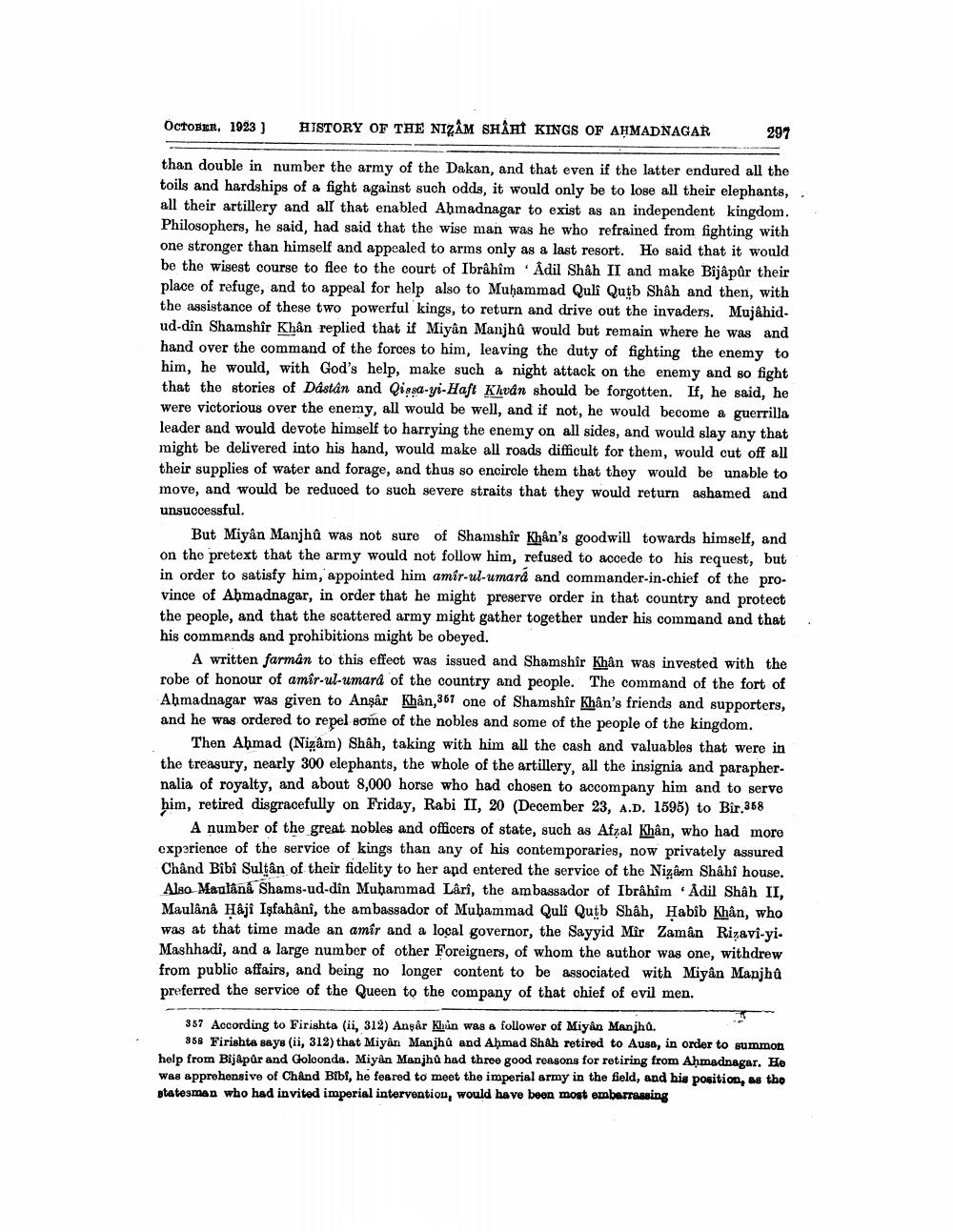________________
Octoban, 1023)
HISTORY OF THE NIZAM SHAH KINGS OF AHMADNAGAR
2
97
than double in number the army of the Dakan, and that even if the latter endured all the toils and hardships of a fight against such odds, it would only be to lose all their elephants, all their artillery and all that enabled Ahmadnagar to exist as an independent kingdom. Philosophers, he said, had said that the wise man was he who refrained from fighting with one stronger than himself and appealed to arms only as a last resort. Ho said that it would be the wisest courge to flee to the court of Ibrahîm Adil Shâh II and make Bijâpûr their place of refuge, and to appeal for help also to Muhammad Quli Qutb Shah and then, with the assistance of these two powerful kings, to return and drive out the invaders. Mujahidud-dîn Shamshir Khân replied that if Miyân Manjhů would but remain where he was and hand over the command of the forces to him, leaving the duty of fighting the enemy to him, he would, with God's help, make such a night attack on the enemy and so fight that the stories of Dastan and Qinsa-yi-Haft Kavan should be forgotten. If, he said, he were victorious over the enemy, all would be well, and if not, he would become a guerrilla leader and would devote himself to harrying the enemy on all sides, and would slay any that might be delivered into his hand, would make all roads difficult for them, would cut off all their supplies of water and forage, and thus so encircle them that they would be unable to move, and would be reduced to such severe straits that they would return ashamed and unsuccessful.
But Miyân Manjhû was not sure of Shamshîr Khân's goodwill towards himself, and on the pretext that the army would not follow him, refused to accede to his request, but in order to satisfy him, appointed him amir-ul-umard and commander-in-chief of the province of Ahmadnagar, in order that he might preserve order in that country and protect the people, and that the scattered army might gather together under his command and that his commends and prohibitions might be obeyed.
A written farman to this effect was issued and Shamshîr Khân was invested with the robe of honour of amir-ul-umard of the country and people. The command of the fort of Ahmadnagar was given to Anşâr Khân,367 one of Shamshir Khân's friends and supporters, and he was ordered to repel some of the nobles and some of the people of the kingdom.
Then Ahmad (Nizâm) Shah, taking with him all the cash and valuables that were in the treasury, nearly 300 elephants, the whole of the artillery, all the insignia and paraphernalia of royalty, and about 8,000 horse who had chosen to accompany him and to serve him, retired disgracefully on Friday, Rabi II, 20 (December 23, A.D. 1595) to Bîr.368
A number of the great nobles and officers of state, such as Afzal Khân, who had more experience of the service of kings than any of his contemporaries, now privately assured Chånd Bibi Sultan of their fidelity to her and entered the service of the Nigam Shahi house. Also Maulana Shams-ud-din Muhammad Lârî, the ambassador of Ibrahim Adil Shah II, Maulânâ Haji Isfahani, the ambassador of Muḥammad Quli Qutb Shah, Habib Khân, who was at that time made an amîr and a local governor, the Sayyid Mir Zaman Rizavi-yi. Mashhadi, and a large number of other Foreigners, of whom the author was one, withdrew from public affairs, and being no longer content to be associated with Miyan Manjhů preferred the service of the Queen to the company of that chief of evil men.
357 According to Firishta (ii, 312) Ansar kuin was a follower of Miyan Manjha.
368 Firishta says (ii, 312) that Miyan Manjhů and Ahmad ShAh retired to Ause, in order to summon help from Bijapur and Goloonda. Miyan Manjhů had three good reasons for retiring from Aḥmadnagar. Ho was apprehensive of Chånd Bibi, he feared to meet the imperial army in the field, and his position, as the statesman who had invited imperial intervention, would have boon most embarrassing




